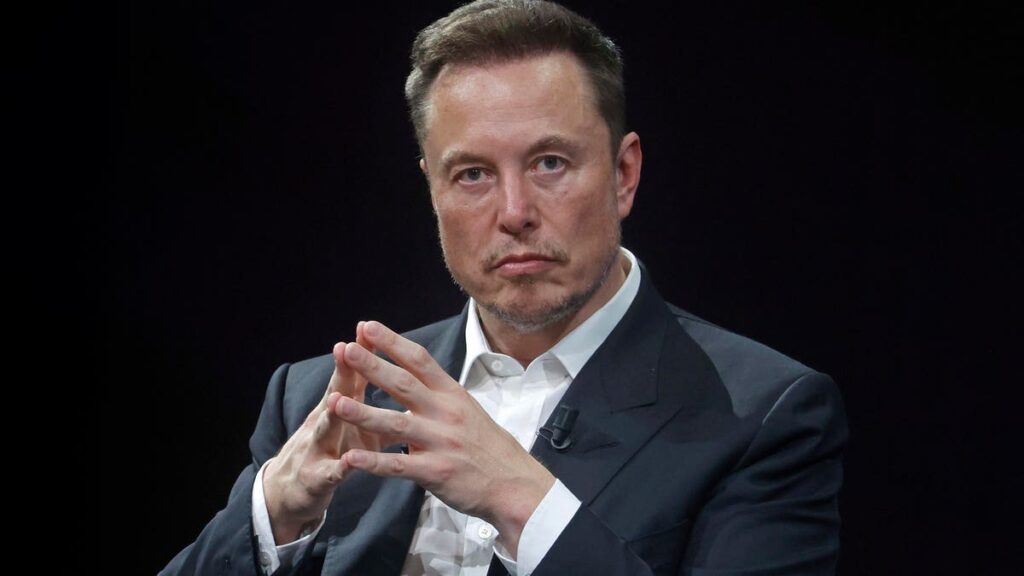Topline
Neuralink’s brain implants could help protect humanity from the risks of artificial intelligence, Elon Musk said on Wednesday, as the company prepares to launch its first in-human trials for the chips it hopes could restore lost functions to people with paralysis.
Elon Musk said Neuralink could reduce the risk from AI.
Key Facts
Neuralink will hopefully play a role in cutting the “civilizational risk” artificial intelligence poses to humanity, Musk said in a post on X.
The implantable tech will allow humans to interact with computers with their thoughts alone and should improve our abilities to communicate with AI “by several orders of magnitude,” Musk explained.
It will also boost the “bandwidth” of human-to-human communication as well, Musk added.
“Imagine if Stephen Hawking had had this,” Musk asked his followers, referencing the late physicist who was almost totally paralyzed with a progressive form of motor neurone disease and warned AI posed an existential threat to humanity.
AI risk reduction is a “long term” goal for Neuralink, Musk conceded, adding that the company is focused on beginning its first in-human trials.
While Neuralink’s first tests are to evaluate the safety and functionality of the implants in humans, Musk said tech “has the potential to restore full body movement.”
Crucial Quote
When combined with Optimus robot limbs, Neuralink means the “Luke Skywalker solution can become real.” The comment hints at a future collaboration between Neuralink and another of Musk’s companies: Tesla. The billionaire has previously described the company’s humanoid robotics project, dubbed Optimus, as its “most important product development” that could overtake its vehicle business over time and he has suggested amputees may one day be given robotic limbs controlled by brain implants. Skywalker, the protagonist of the original Star Wars trilogy portrayed by Mark Hamill, was given a robotic prosthesis after losing his arm in The Empire Strikes Back.
News Peg
Neuralink started recruitment for its first human clinical trial on Tuesday. The company said it had secured approval from an independent review board to begin testing the implants in people with paralysis, initially to test both safety and functionality of the device. It comes after Neuralink announced it had secured Food and Drug Administration approval to launch its first “in-human clinical study” of the device, which it said “represents an important first step that will one day allow our technology to help many people.” The company said it is searching for participants who have “quadriplegia due to cervical spinal cord injury or amyotrophic lateral sclerosis,” or ALS, are at least 22 years old and “have a reliable caregiver,” with the trial expected to take around six years to complete. The chip will be installed by the company’s surgical robot in the part of the brain controlling the intention to move and early goals are to allow people the ability to control a computer cursor or keyboard through thought. It is not clear how many people Neuralink plans to recruit or its other goals in the trial. The launch of the trials comes after years of overly optimistic predictions from Musk that they were just around the corner and the company is one of many developing neurotechnology, with other firms like Blackrock Neurotech and Synchron having already started human trials.
Key Background
When it comes to AI, Musk’s prophecies have been decidedly less optimistic and he is part of a significant cadre of tech leaders, entrepreneurs and researchers calling for a more considered approach to the development of the transformational technology. While acknowledging the many societal risks AI already poses to humanity—such as facilitating discrimination, boosting inequality and bias, disrupting politics, upending the economy and promoting disinformation—many are concerned AI, if developed poorly or carelessly, could one day pose an “existential risk” to humanity and ultimately threatens the species’ survival. Musk and others have said melding humanity and machines through technology like Neuralink’s implant could help avert this risk.
Tangent
News of Neuralink’s impending human trials come amid ongoing allegations of animal cruelty and claims monkeys used to test the device died as a result of the brain chips. The firm has strenuously denied animal cruelty claims and Musk himself has said “no monkey has died as a result of a Neuralink implant,” though he said only monkeys already “close to death” were used to trial early implants. Documents apparently contradict this claim and outline a range of health issues in monkeys receiving the implant—including infections, brain swelling, paralysis, seizures, bloody diarrhea and a loose device—before they were euthanized, Wired reported on Wednesday.
Forbes Valuation
$261.4 billion. That’s Musk’s estimated net worth, according to Forbes’ real time tracker. He is the world’s richest person by a sizable margin, leading French luxury goods magnate Bernard Arnault, who has an estimated fortune of $192.5 billion. Much of Musk’s wealth comes from his stake in electric carmaker Tesla and a group of valuable companies he cofounded and leads including SpaceX, Neuralink and The Boring Company. He believes X, which he acquired as Twitter for $44 billion in 2022, could help his fortune grow even further by becoming a trillion dollar company in the future.
Further Reading
Elon Musk’s Neuralink Wants To Put Chips In Our Brains — How It Works And Who Else Is Doing It (Forbes)
Elon Musk’s Neuralink Wants Volunteers For First Human Trial Of Its Brain Implant Chip (Forbes)
The Gruesome Story of How Neuralink’s Monkeys Actually Died (Wired)


